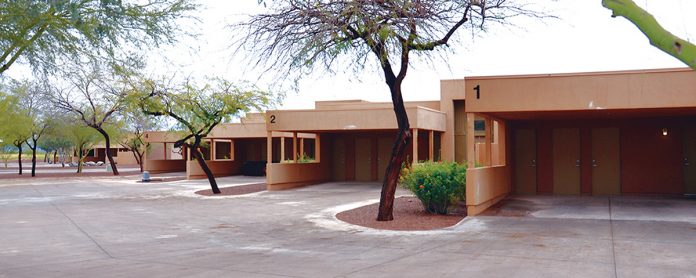By Marissa Johnson
O’odham Action News
marissa.johnson@srpmic-nsn.gov
Now that the Social Services Department of the Salt River Pima-Maricopa Indian Community has moved into its newly renovated space, staff members are moving full speed ahead on several new projects.
The department is scheduled to break ground for a new 14-unit apartment complex at Alma School and Osborn roads. These apartments will wrap around the existing group home and Senior Services Center. They are part of the Preparation for Adult Living (PAL) program, which helps youth transition into adulthood through independent living. Rent is $250 a month for these two-bedroom, two-bathroom apartments, which includes water and electric utilities. Tenants are required to attend monthly meetings addressing topics such as budgeting, hygiene, job-seeking, finances and general living skills. An independent living specialist will meet with these young clients weekly to develop individualized plans for them and work on their independent living skills.
The new apartments will have the same design as the apartments located at Camelback Road and Center, next to Salt River High School. After construction is complete and all the residents are moved out of the old apartments, those apartments will be renovated and offered to the Housing Department for Community members to rent.
As for group homes, Social Services has been implementing more cultural and wellness aspects into the program.
“We have definitely grown in taking a bigger look at the wellness of the child,” group home manager Karen Jorgensen said. “We focus on three things in the group homes: the child’s wellness, education and their living skills. We also are training our staff to become more health conscious with meal planning because diabetes is such an issue here in the Community. We’re trying to [take] more preventive measures in the nutrition of these children. So, we are partnering with the Diabetes Program to educate our staff and our children in regards to healthy nutrition … so these children do not get early diabetes.”
Group Homes
As for group homes, Social Services has been implementing more cultural and wellness aspects into the program.
“We have definitely grown in taking a bigger look at the wellness of the child,” group home manager Karen Jorgensen said. “We focus on three things in the group homes: the child’s wellness, education and their living skills. We also are training our staff to become more health conscious with meal planning because diabetes is such an issue here in the Community. We’re trying to [take] more preventive measures in the nutrition of these children. So, we are partnering with the Diabetes Program to educate our staff and our children in regards to healthy nutrition … so, these children do not get early diabetes.”
Social Service group home staff strives to expose the children to O’odham and Piipaash cultures and traditions.
“We do offer a lot of [cultural interaction]; about one-third of our staff are Community members who offer the children traditional cultural experiences,” said Jorgensen. “We really want these children in the group home to feel they can stay in this Community and still get the cultural [education they need]. We really pride ourselves on doing that.”
Jorgensen added to what is being implemented to the Group Homes, is that Social Services’ focus is on trying to find kinship homes for children placed under Social Services.
“Obviously, family is the number-one placement option for children that are removed [from their homes]. If [family placement] can’t happen, Social Services really looks at the group homes because we are here in the Community,” said Jorgensen.






